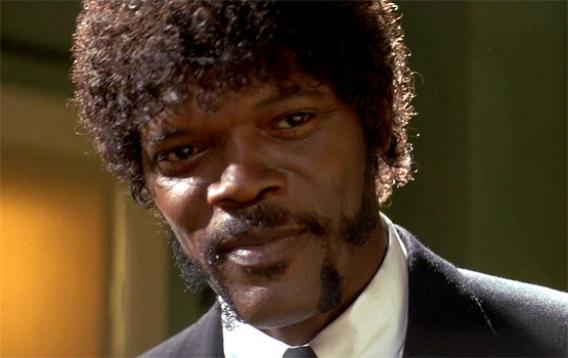The most memorable line in Zero Dark Thirty, the one that prompted its own article in the Los Angeles Times this month, comes when the hero (played by Jessica Chastain) defiantly tells the CIA director (played by James Gandolfini), “I’m the motherfucker that found this place, sir.” For Maya and others to be a “motherfucker” can be a mark of pride, with everyone from Kanye West to Pulp Fiction’s Jules Winnfield wearing it proudly. When did it become badass to be a “motherfucker”?
Around the 1950s. People have been calling each other motherfuckers for over a century, but until World War II the term was typically used as an insult. The earliest citations of motherfucker and motherfucking in the Oxford English Dictionary come from the late 19th and early 20th centuries, and they give a sense for how seriously the word was taken. The OED’s first citation of the word comes from the Texas Court of Appeals’ account of the 1889 trial of Levy v. State, where witnesses describe a defendant being called a “God damned mother-f—cking, bastardly son-of-a-bitch.” It’s perhaps revealing that, of the four expletives, mother-fucking is the only one to get censored. The Texas Court of Criminal Appeals apparently felt more comfortable printing the word just a few years later. Their records from 1898 include an account in which the word is offered almost as grounds for murder: A defendant suggests that he should be partially excused of killing a man just because the man had called him a “mother-fucking son-of-a-bitch.” The earliest citation of the noun motherfucker (as opposed to motherfucking) tells of a man who faced a different kind of punishment for wielding the word: After a black soldier sent a defiant letter to his draft board in which he called them “low-down Mother Fuckers,” he was court-martialed and did ten years of hard labor.
By World War II the word was used to refer to something “unpleasant, difficult, formidable, or oppressive,” i.e., a pain in the ass. Norman Mailer was particularly fond of this usage. The slight euphemism “mother-fugger” appears repeatedly in his 1948 World War II novel The Naked and the Dead, and one of the first recorded instances of “motherfuck” can be found in his 1967 novel Why Are We in Vietnam? He later said he used the word because “it was a fair word to use to give the quality of the Army experience.” He also said that the word “was not used to intimidate” but instead to “fill certain spaces in the thought waves.” As that latter quote suggests, it was around this time that the word lost its purely pejorative status, and when (in the case of motherfucking) it became an intensifier.
By the late ‘50s and ‘60s, motherfucker finally became, in some usages, a positive description. The first instance recorded in the OED comes from a 1958 recitation of the folk tale of “Stagger Lee,” the legend (based on a true story) of the black man who would not back down. The next year R&B singer Lloyd Price made the song into a no. 1 hit—though the song was cleaned up before it could top the charts. A 1954 line in the The Life, a collection of oral poetry about black hustlers, reads, “I love him madly, he’s my motherfucking man,” showing that the adjective form could also be used positively. “What a motherfucking man he was, Shamus!” exclaims one character, similarly, in the 1973 novel Fogarty & Co. Indeed by the ’70s you didn’t even need to say it: Isaac Hayes could call a sex-machine detective a “bad mother—” if he was just talkin’ about 1971’s Shaft. The word surfaced in the mainstream partly thanks to comedians like Lenny Bruce, who was arrested for using the word in 1964. In Bruce’s obscenity trial, journalist and What’s My Line contestant Dorothy Kilgallen testified that “among show business people” sometimes the word was used “as a term of endearment.” A few years later George Carlin named it among his “seven dirty words you can never say on television.” (In 1972, Carlin was himself arrested, for performing that bit at Milwaukee’s Summerfest.)
There’s no evidence that the word was ever meant to be taken literally, as a reference to incest. In the Lenny Bruce trial, a minister who heard Bruce’s performance firsthand was asked, “To the uninitiated, to the unsophisticated … might someone understand the word ‘motherfucker’ as having to do with mothers and fucking?” The minister said he didn’t think it had anything to do with it. Newsweek drama critic Richard Gilman similarly testified that “it’s common parlance and does not mean that the individual is being accused of having had intercourse with his mother.”
Though some folk etymologies suggest that the term was based on the experience of the African-American slave, there’s no hard evidence for this, either. According to this theory, the term was used to refer to “White slavemasters … who raped your mother in order to break the Black family down, physically and psychologically,” and also served “as a means to avoid calling your slavemaster your ‘father.’ ” However, according to Jesse Sheidlower, editor at large of the Oxford English Dictionary and author of The F-Word, “any kind of folk etymological explanation of motherfucker or motherfucking is not true” and “there’s no evidence of the term from slavery times and nothing to suggest that it ever was used in reference to slave masters.” While the first recorded instance of the word happens to be from an African-American, Sheidlower says “there’s evidence of its use, even at early times, from whites as well.”
How Mofo Got Its Mojo

Samuel L. Jackson as Jules Winnfield in Pulp Fiction
© 1994 - Miramax.
Advertisement